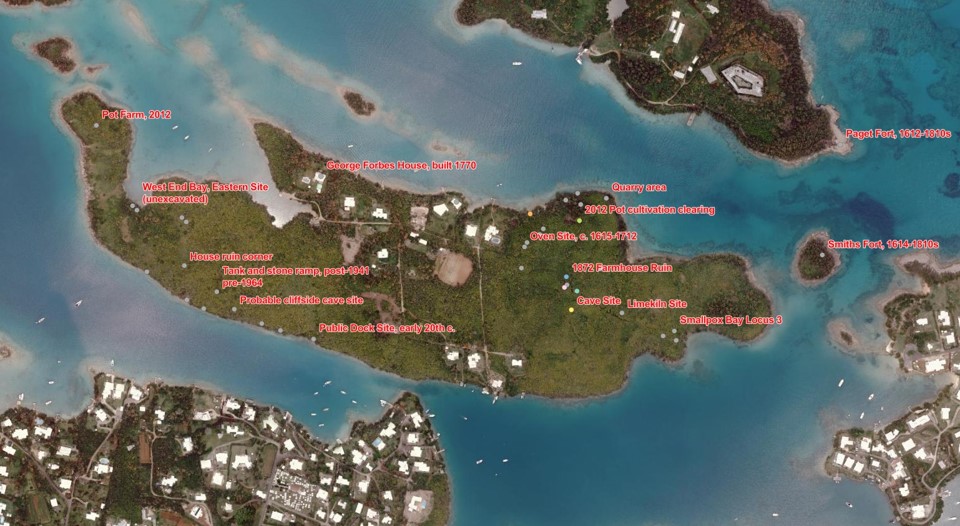Fieldwork
This listing expired on April 10, 2023. Please contact michael.jarvis@rochester.edu for any updated information.

Location: Bermuda
Season: May 21, 2023 to July 2, 2023
Session Dates: May 22 - July 2, 2023
Application Deadline: March 22, 2023
Deadline Type: Rolling
Website: http://smithsislandarchaeology.blogspot.com/p/historical-archaeology-field-school-2023.html
Program Type:
Field School, Volunteer
RPA Certified:
No
Affiliation:
University of Rochester
Project Director:
Dr. Michael Jarvis
Project Description:
Now entering its twelfth season, the Smith’s Island Archaeology Field School has trained dozens of students in excavation and research methods and prepared them for graduate study and professional work. This unique program studies the early Modern Atlantic World from Bermuda – an island at its center – as we investigate two early 17th -century sites dating to the dawn of settlement. Students are involved in all aspects of fieldwork during our six-week season: excavation, artifact identification, documentary research, mapping, and photography. Through readings, archival research, and exploration of local sites and museums you will learn about Bermuda’s rich history and processes of cultural hybridity and creolization embedded in American and African Diasporic history. Prior archaeological experience or knowledge of early American history is not required.
Period(s) of Occupation: Colonized in 1612, Bermuda is Great Britain's oldest remaining colony and occupies a central physical, natural, and cultural crossroads location in the North Atlantic Ocean. It was the first English colony to import enslaved African workers (1616) and developed its own unique maritime economy, speech, and architecture. Using the whole of Smith's Island as our unit of study, we study agricultural, maritime, and domestic sites (including sites of enslavement) across four centuries.
Notes:
Our field school is based in St. George’s, a UNESCO World Heritage Site, which boasts many 18th-century houses and forts and is still an active sailing port. Students will be immersed in Bermudian culture and will work alongside Bermudian volunteers. We will live on nearby Paget Island and commute to work daily by boat. Work will include excavations on Smith’s Island and artifact processing and analysis in our lab in St. George’s. By the end you will have developed core skills for employment as a professional archaeologist and a solid understanding of archaeological research methods.
There is a $4,950 program fee which covers food, housing, in-country travel and tuition for 4 University of Rochester college credits but does not include airfare to/from Bermuda.
Volunteers with relevant archaeological experience or specialist skills (ex. zooarchaeology) should contact the project director to discuss non-field-school participation options.
Project Size: 1-24 participants
Minimum Length of Stay for Volunteers: 6 weeks
Minimum Age: 18
Experience Required: None
Room and Board Arrangements:
The $4,950 program fee covers food, housing, in-country travel, and tuition. Students live on Paget Island in a Bermuda Government camp facility with two large barracks rooms with bunk beds. Basic food staples are provided for students to cook either individually or communally. We make every effort to accommodate dietary restrictions but cannot guarantee this fully. Students have use of Paget Island, which includes its own beach.
Academic Credit:
Students typically enroll in HIS 258 Archaeology Field & Research Methods. Students with prior archaeological field experience can take HIS 358 Advanced Field Methods and graduate students can enroll in HIST 458. These courses satisfy requirements in Rochester’s history, anthropology, and Archaeology, Technology, and Historic Structures majors.
Michael Jarvis
362 Rush Rhees Library
Rochester
NY
14627-0070
United States
Phone: (585) 485-9870
The AIA is North America's largest and oldest nonprofit organization dedicated to archaeology. The Institute advances awareness, education, fieldwork, preservation, publication, and research of archaeological sites and cultural heritage throughout the world. Your contribution makes a difference.
Notifications